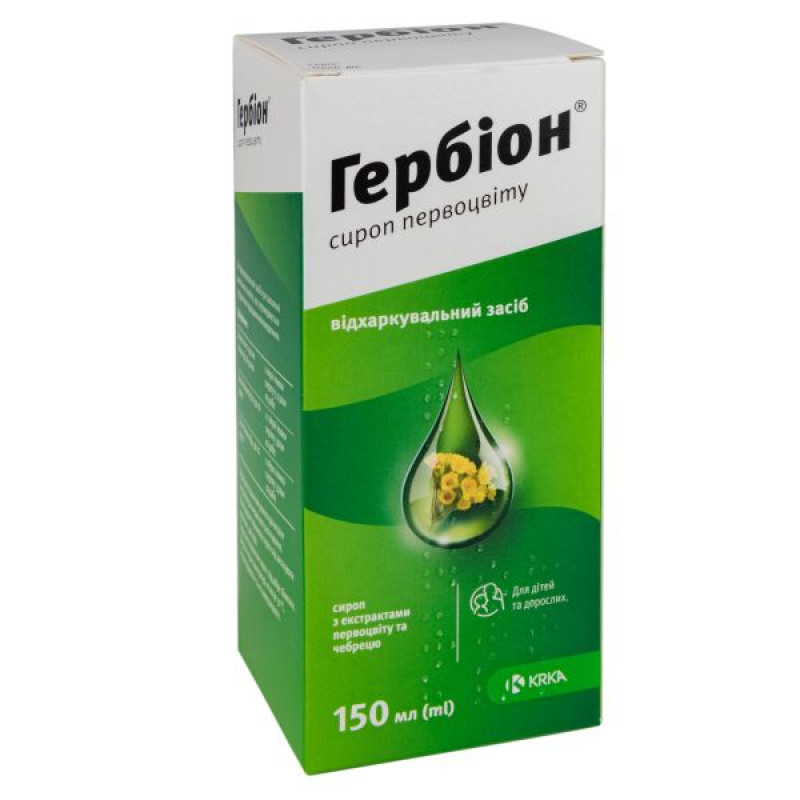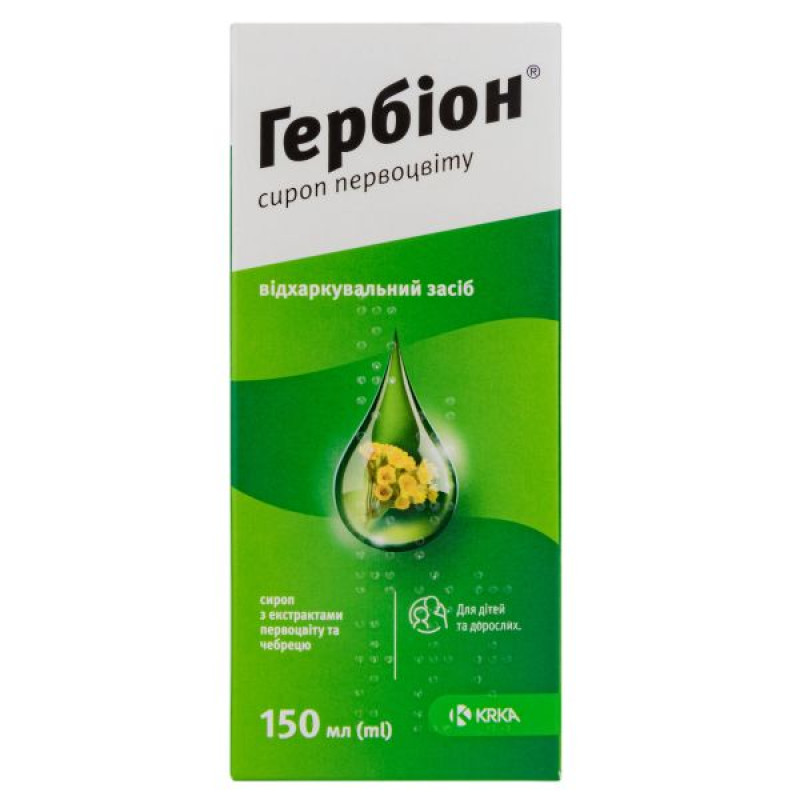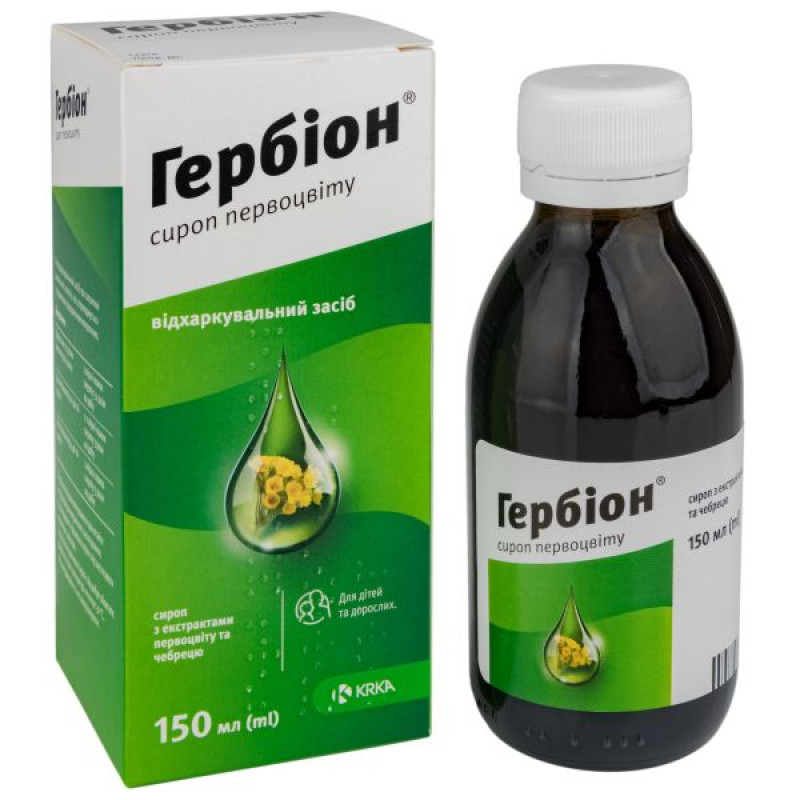Herbion syrup Primrose syrup bottle 150 ml

Instructions Herbion syrup Primrose syrup bottle 150 ml
Composition
active ingredient: liquid extract of primrose root, liquid extract of thyme herb;
5 ml of syrup (1 measuring spoon) contains liquid extract of primrose root (Radix Primulae veris, Radix Primulae elatior) (1:2-4.6) (extractant – water) ─ 1.03 g; liquid extract of thyme herb (Herba Thymi vulgaris, Herba Thymi zygis) (1:3.3) (extractant – water) ─ 2.06 g
excipients: levomenthol, sucrose, methyl parahydroxybenzoate (E 218).
Dosage form
Syrup.
Main physicochemical properties: brown syrup with a specific smell and taste. A small precipitate is possible, typical of natural substances.
Pharmacotherapeutic group
Medicines used for coughs and colds. ATX code R05C.
Pharmacological properties
Pharmacodynamics
The effect of the drug has not been determined in clinical studies and has been established on the basis of pharmacological studies and many years of empirical experience (level of evidence for effectiveness - IV). The drug contains a mixture of aqueous extracts of primrose root (Primulae veris L. and/or Primula elatior L. Hill) and thyme herb (Thymus vulgaris L. and/or Thymus zygis L.).
These active substances help to expectorate thick phlegm from the bronchi in respiratory inflammation, colds and flu. Due to the high content of saponins, primrose root preparation is used as an expectorant (mucolytic) agent.
Saponins stimulate vagal receptors located on the gastric mucosa, thereby activating the gastropulmonary reflex, increasing bronchial secretion production, and improving expectoration. The surface activity of saponins consists in the formation of a monomolecular film, which makes it possible for them to spread from the throat along the surrounding mucous membrane of the respiratory tract, and thus, they have a local effect on the liquefaction and removal of thick mucus from the bronchi.
Thyme herb promotes expectoration and acts as a bronchodilator due to the content of essential oil, the main part of which is excreted through the lungs. On its way to the lungs, the drug stimulates the secretion of mucus and expectoration of phlegm, while also exerting a mild antispasmodic effect on the smooth muscles of the respiratory tract and, thus, relieving spasm. Thymol, the main component of the essential oil, has an antiseptic effect.
Pharmacokinetics
Studies on the absorption, distribution and metabolism of the active substances in the syrup have not been conducted, since it is not known which active substance and to what extent it contributes to the effect.
There are no data on the pharmacokinetics of saponins contained in primrose root. It is known that a small amount of saponins is absorbed. After oral administration of the drug, the main component of the essential oil of thyme extract - thymol - is rapidly absorbed. Its maximum concentration in the blood plasma is reached after 1.97 hours. In the body, thymol breaks down into sulfate and glucuronide. Blood plasma contains mainly sulfate. Part of thymol or thyme essential oil is excreted through the lungs. During the day, 16% of thymol is excreted in the urine in the form of glucuronide and sulfate.
Indication
As an expectorant for inflammation of the respiratory tract, accompanied by difficult sputum discharge; for acute respiratory diseases accompanied by spastic cough; for irritating cough in pharyngitis, tracheitis.
Contraindication
Hypersensitivity to the active substances or to any of the inactive components of this preparation; hypersensitivity to other plants of the Primula genus; hypersensitivity to other plants of the Lamiaceae family, as well as sensitivity to celery and birch pollen (cross-reaction possible). Gastritis, peptic ulcer disease. History of acute obstructive laryngitis in children; bronchial asthma.
Interaction with other medicinal products and other types of interactions
Unknown. If it is necessary to use any other medicines at the same time, you should consult a doctor.
Application features
Herbion® primrose syrup contains sucrose, so it cannot be recommended for people with diabetes.
If during treatment with the drug the patient's condition worsens and/or shortness of breath, fever, purulent sputum appear, you should consult a doctor.
If symptoms do not disappear after 1 week of using the syrup, you should consult a doctor about further therapy.
Special information about some excipients
Herbion® primrose syrup contains sucrose. Therefore, patients with rare hereditary problems of fructose intolerance, glucose-galactose malabsorption or sucrase-isomaltase deficiency should not take this medicine.
Use during pregnancy or breastfeeding
Due to the lack of sufficient reliable data on the use of the drug during pregnancy or breastfeeding, the use of the drug during this period is not recommended.
Ability to influence reaction speed when driving vehicles or other mechanisms
Method of administration and doses
Adults and children over 16 years of age are prescribed 2 measuring spoons of syrup 3-4 times a day.
Children aged 10 to 16 years are prescribed 1-2 measuring spoons of syrup 3 times a day.
Children aged 4 to 10 years are prescribed 1 measuring spoon of syrup 3 times a day.
Patients should not consume food or drink immediately after taking the drug, as this may accelerate the elimination of the drug from the mucous membrane of the mouth and throat.
During the period of using the syrup, it is recommended to drink plenty of tea or other warm drinks.
The bottle should be shaken well before use.
Children
The syrup should be used for children aged 4 years and over.
Overdose
There have been no reports of any cases of overdose.
Overdose may cause gastrointestinal upset, vomiting, or diarrhea. Treatment is symptomatic.
Adverse reactions
Side effects that may occur when using Herbion
® primrose syrup, classified into the following groups according to their frequency:
- very often (> 1/10),
- often (> 1/100, < 1/10),
- uncommon (> 1/1,000, <1/100),
- rarely (> 1/10,000, < 1/1,000),
- very rare (<1/10,000),
- unknown (frequency cannot be estimated from the available data).
Immune system disorders.
Not known: allergic reactions, hypersensitivity reactions (including anaphylactic shock and angioedema).
If severe side effects occur, treatment should be discontinued.
Methyl parahydroxybenzoate (E 218) may cause allergic reactions (possibly delayed).
Digestive tract disorders.
Very rare: gastrointestinal disorders (including nausea, vomiting, diarrhea).
If the symptoms of the disease do not improve during the period of use or if side effects not listed in this list are observed, you should stop using the drug and consult a doctor.
Expiration date
3 years.
After opening the bottle, the syrup should be used within 3 months.
Storage conditions
Store at a temperature not exceeding 30 °C. Do not refrigerate or freeze. Keep out of the reach of children.
Packaging
150 ml of syrup in a bottle together with a plastic measuring spoon in a cardboard box.
Vacation category
Without a prescription.
Producer
KRKA, dd, Novo mesto, Slovenia.
Location of the manufacturer and its business address
Smarjeska cesta 6, 8501 Novo mesto, Slovenia.
There are no reviews for this product.
There are no reviews for this product, be the first to leave your review.
No questions about this product, be the first and ask your question.









